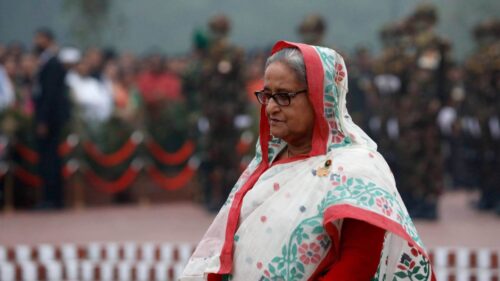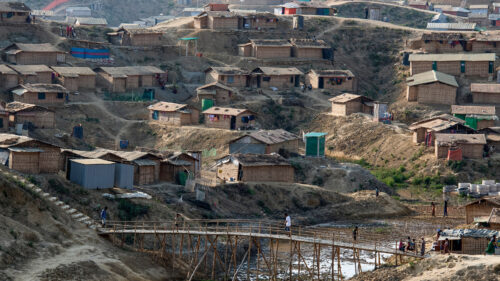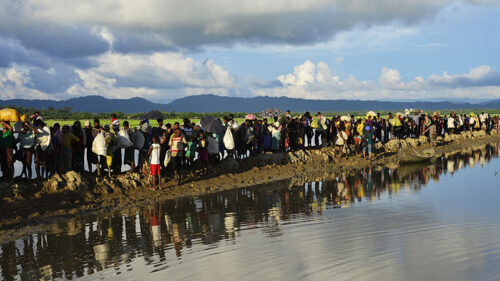The Rohingya refugee community living in camps in Cox’s Bazar, Bangladesh, seems to have been trapped in Satan’s trifecta. With dwindling funds and increasing violence in the camps, their camp life has become a living hell; on the other side of the border, in Myanmar, there seems to be no hope of returning. Myanmar is struggling with its military dictators, and the Rohingya who are trying to escape both these miseries and journey into a new life through the sea, are drowning in boats — leaving their loved ones in despair.
Recently, Amy Sood, a reporter for South China Morning Post, claimed that Rohingyas are facing a “second genocide” in Bangladesh, which is falsified and misleading because it sounds like Bangladesh is targeting and killing Rohingyas.
Bangladesh has taken every action it believes possible for the vulnerable refugees — but as international donors and humanitarian organizations keep showing their backs, it’s getting nearly impossible for the developing country to make itself a safe haven for the Rohingya community without stretching its own resources beyond the breaking point.
Since fleeing Myanmar on foot during the 2017 military campaign against them, which has been recognized as genocide by many in the international community, nearly one million Rohingya have been hosted by Bangladesh. Since then, there’s no doubt that the persecuted community has gotten a lot of attention, aid and sympathy from across the world, but with time, all of that has come to sound more like lip service.
The struggles of the impoverished and less-educated community seem to be of less concern, as international donors are now focused on refugees who share racial and ethnic similarities and have sought refuge in their affluent European surroundings, such as Ukraine.
The congested and unhygienic nature of the camp is a boon for diseases and has become a fire hazard too- last March, 12000 Rohingyas became homeless because of a sudden fire in the camps. If this wasn’t enough, the recent aid cut for the community has been like rubbing salt in the wound. Since the pandemic hit in 2020, international funding for necessities has dropped as donor fatigue sets in. In 2023, the Rohingya Humanitarian Crisis Joint Response Plan barely gathered 40 percent of the required funds.
Lack of resources and rise in crime
Shrinking budgets have forced the UN and international NGOs to lay off refugees from paid volunteer roles, which are one of their few legal sources of income. The UN has had to cut vital food assistance by one-third, from $10 to $12 per person per month in March to $8 per person per month by June — meaning only $0.27 per day is allocated for each Rohingya.
As Bangladesh is already going through a crisis of food inflation, this cut will further add to the widespread malnutrition in the camps. Mothers are concerned about how to limit the size of their children’s meals further and how much longer they can sustain such reductions.
Conditions in the refugee camps are getting more dire by the day for the Rohingya. Education opportunities for the children are very limited, especially considering that many of them have grown up in these camps in the last six years. Due to Bangladesh’s issues of climate change, the refugee camps face risks of significant heat waves, floods and tornados with nowhere to run.
Such poverty and hopelessness, allied with the vicious cycle of violence in the camps, have further worsened the situation for the refugees. The Rohingyas, particularly young men, have been involved in various crimes, including kidnapping, drug peddling, illegal trading of counterfeit money, robbery and gold smuggling, joining criminal gangs and armed groups, fueling more violence. They reportedly joined to receive a monthly payment of BDT 5,000 (approximately 50 USD) for active participation.
Over the past six years, a total of 186 killings have occurred in the Rohingya camps in Bangladesh, along with more than 500 kidnappings. These can be linked to the criminal activities of different separatist groups like the Arakan Rohingya Salvation Army (Arsa) and the Rohingya Solidarity Organization (RSO). Locals reveal that these groups enter the camps every evening with arms while torturing and stealing from other Rohingyas. The government-appointed Armed Police Battalion (APBn) raids become ineffective as the groups take positions in different hideouts and return at night once the operations end, continuing their havoc.
These insurgent groups set up their bases in the camps since their arrival in Bangladesh, but their increasing illegal activities have a deepening basis now: their antagonism towards repatriation efforts, the drug and arms trade in Rohingya camps with terrorist connections, and establishing superiority in the camps.
Rising tensions: The Rohingya’s continued desperation
To escape this violence and for a better life, many Rohingyas have been heading eastward by sea to Muslim countries like Malaysia and Indonesia. The UN says it tracked a 360% spike in the number of Rohingya risking their lives on these dangerous boat journeys in 2022 — from 700 to 3,500. These people choose the risk of being detained, trafficked, seasick, hungry and lost in the sea with no hopes of being rescued to live off charity in the refugee camps anymore.
With the skyrocketing crime rates, panic and fear are also rising in Cox Bazar on the southeast coast of Bangladesh. Host versus the Rohingyas tension is on the rise. Residents of Cox’s Bazar are considering that their safety is at risk as the vast number of Rohingyas in the district has made the locals a minority.
Bangladesh authorities have tried their utmost to address all these issues to the best of their ability. The camps have transitioned from scorched earth to paved ways like cities. To increase the security of both the locals and the refugees, authorities have placed barbed wire fences and deployed security forces. They have also relocated more than 100,000 refugees to Bhasan Char camps to deal with the severe overcrowding in the refugee camps in Cox’s Bazar. The country has already spent $1.69 billion in 2022 alone to support Rohingya refugees.
While Bangladesh struggles, the perpetrator of the whole tragedy, Myanmar, keeps beating around the bush about Rohingya refugees and their citizenship. Still, Bangladesh is trying to adhere to the principle of non-refoulement — not returning refugees to a place where they would face persecution. But the international community, instead of taking strict political and legal actions against the brutal Junta, is busy showering it with FDI. Foreign direct investment into Myanmar from 2017 to 2020 was greater than that of Bangladesh.
Another year has passed- Bangladesh celebrated its biggest festival, Durga Puja, and the world is busy with the Ukraine and Israeli war, but Rohingyas stand still in a state of limbo. We cannot forget, and neither can the international community. The pledge to protect human rights above all should be reminded to the world humanitarian services, and a political solution to the resettlement of the Rohingyas must be encouraged.
[Tara Yarwais edited this piece.]
The views expressed in this article are the author’s own and do not necessarily reflect Fair Observer’s editorial policy.
Support Fair Observer
We rely on your support for our independence, diversity and quality.
For more than 10 years, Fair Observer has been free, fair and independent. No billionaire owns us, no advertisers control us. We are a reader-supported nonprofit. Unlike many other publications, we keep our content free for readers regardless of where they live or whether they can afford to pay. We have no paywalls and no ads.
In the post-truth era of fake news, echo chambers and filter bubbles, we publish a plurality of perspectives from around the world. Anyone can publish with us, but everyone goes through a rigorous editorial process. So, you get fact-checked, well-reasoned content instead of noise.
We publish 2,500+ voices from 90+ countries. We also conduct education and training programs
on subjects ranging from digital media and journalism to writing and critical thinking. This
doesn’t come cheap. Servers, editors, trainers and web developers cost
money.
Please consider supporting us on a regular basis as a recurring donor or a
sustaining member.
Will you support FO’s journalism?
We rely on your support for our independence, diversity and quality.











Comment